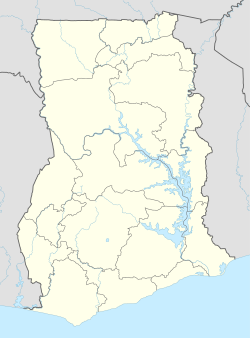Kormantse is a settlement in Mfantsiman Municipal District, Central Region, Ghana.[1] Kormantse is located along the coast, close to the site of the Fort Amsterdam, a major historic slave fort. Fishing is a major economic activity in the settlement.
Kormantse | |
|---|---|
| Coordinates: 05°12′N 01°04′W / 5.200°N 1.067°W | |
| Country | Ghana |
| Region | Central Region |
| District | Mfantsiman Municipal District |
| Population (2010) | |
• Total | 8,501 |
History
editThe settlement is located near Fort Amsterdam, a major slave fort built by the English, and later occupied by the Dutch.[2]: 3 Due to the original location of the fort being adjacent to Kormantse, many who passed through the fort were referred to as “Kormantse”.[2]: 3 The area became a major regional trading center for the coastal kingdoms of Eguafo, Asebu, and Efutu, as well as various chiefdoms away from the coast.[2]: 7
Geography
editKormantse is located along the coast,[1][3]: 4 and is the site of numerous lagoons.[3]: 1
Demographics
editAs of the 2010 Ghanaian census, Kormantse has a population of 8,501.[3]: 79 Kormantse has 4,002 males and 4,499 females, comprising 2,161 households who reside in 1,094 houses.[3]: 79 3,334 people are under the age of 15, 4,498 people are between the ages of 15 and 64, and 669 people are age 65 and older.[3]: 80
Economy
editCulture
editKormantse is a major regional center in the production of Asafo flags.[4]
See also
editReferences
edit- ^ a b c "About Us". www.mfantsemanma.gov.gh. Mfantseman Municipal Assembly. Retrieved 2023-11-17.
- ^ a b c d e Agorsah, E. Kofi; Butler, Thomas (2008-09-01). "Archaeological Investigation of Historic Kormantse, Ghana: Cultural Identities". African Diaspora Archaeology Newsletter. 11 (3).
- ^ a b c d e f "2010 Population & Housing Census District Analytical Report: Mfantseman District" (PDF). 2010. Archived from the original (PDF) on 2016-03-05. Retrieved 2023-11-17.
- ^ a b Forni, Silvia; Ross, Doran (2017). Art, Honor, and Ridicule: Fante Asafo Flags from Southern Ghana. p. 56.
This article needs additional or more specific categories. (November 2023) |
